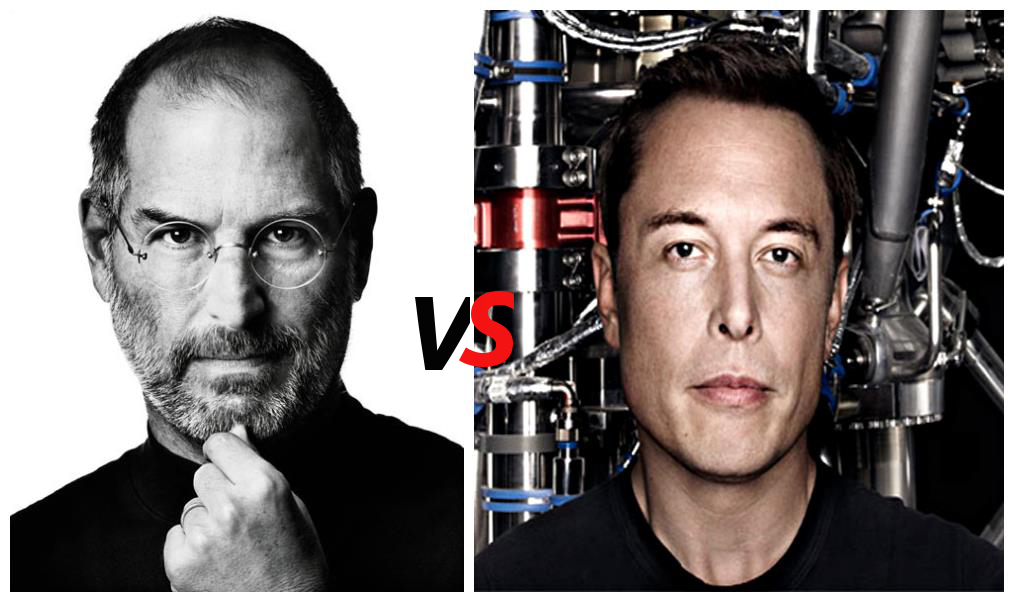
Feb 5, 2014 | Electric Vehicles, Entrepreneurship & Innovation
By Alison van Diggelen, host of Fresh Dialogues
Elon Musk has been hailed as the next Steve Jobs, a serial disruptor and a genius. Others call him just crazy. Yet Musk has defied the naysayers and made remarkable innovations in both electric cars and spaceflight over the last ten years. But just how accurate is the Steve Jobs comparison?
“Most innovation is like a new melody,” writes Ted curator Chris Anderson. “For Jobs and Musk, it’s the whole symphony.”
Anderson’s analogy is right. Neither men do things in small measures. They seek to change the world.
I interviewed Elon Musk last year in one of his most revealing public appearances, and he exposed a complex character that is both deadly serious yet comedic at times; driven yet sensitive; single minded, and yet eclectic in his desire to change the world in multiple ways.
.
That sensitivity was apparent several times during our dialogue when his eyes welled up in response to my questions about the future of NASA, Neil Armstrong, and candlelight vigils for the EV1 (@28:35, 1:04:00 & 39:50 in the video). Steve Jobs was also known to weep.
Musk has many traits in common with Jobs and yet in subtle ways their characters are distinct. Elon Musk vs Steve Jobs. The two did meet, but it didn’t go well.
Here are five revealing moments from our conversation that emphasize the common threads between the two businessmen.
1. Ability to Sell Great Ideas
Jobs used his infamous “reality distortion field” to push his teams hard to achieve much more that they thought was possible. His oft-quoted phrase was “insanely great” and his product launches were passionate and brash.
Musk is more pragmatic in his approach, he rarely uses buzzwords*, and although his product launches are often equally dazzling, his delivery is less assured, more halting.
*Granted, he does talk about getting a “money shot” of his greenhouse on Mars idea (@30:00 in the video).
“In the beginning there will be few people who believe in you or in what you’re doing but then over time… the evidence will build and more and more people will believe in what you’re doing. So, I think it’s a good idea when creating a company to … have a demonstration or to be able to sketch something so people can really envision what it’s about. Try to get to that point as soon as possible.” Elon Musk
This Word Art of our 90-minute conversation reveals no catchy buzzwords, though the word THINK stands out prominently.
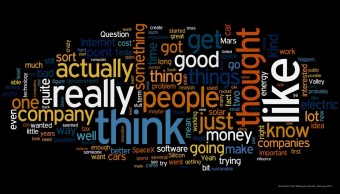
Source: Tyra Robertson
2. Obsessive Attention to Detail:
Stories abound of Steve Jobs’ intense attention to detail. He notoriously spent months agonizing over the internal layout of the Mac computer’s circuit board.
“I want it to be as beautiful as possible, even if it’s inside the box. A great carpenter isn’t going to use lousy wood for the back of a cabinet, even though nobody’s going to see it.” Steve Jobs
When his team failed to deliver on his vision, Jobs often flew into terrible rages. Case in point: the first fanless computer.
By contrast, Musk is known for his attention to detail and being a demanding boss, but he focuses his Vulcan rage at the media over issues like damning test drives, and Tesla car fires; and at foes such as auto dealerships.
His rage also turns inward. For example, when he discovered the wrong type of screw used in the Model S sun visors. He reportedly said, “they felt like daggers in my eyes.”
While doing pre-interviews with Musk’s colleagues, I heard a revealing story about his obsession with the Tesla Model S key fob. A colleague described how he agonized for weeks over the shape, the girth, the weight of the fob till it was just right. Take a peek at the end result and see if you think it was all worth it.
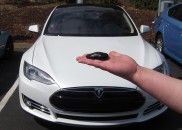
When I visited the Tesla factory (on assignment for KQED), I heard a similar story from the mechanics working on the iconic Model S door handles. Responsive door handles that sit flush with car doors looked like mission impossible, yet Musk and his team eventually prevailed. The result is so highly prized that my tour guide, Gilbert Passin (VP for manufacturing at Tesla) forbade me to take close-up photos of the components, for fear of copycats.
3. Ability to Think Differently Stems from Splendid Isolation
When I asked Musk if he was a lonely kid, he replied:
“I wasn’t all that much of a loner…at least not willingly. I was very very bookish.” Elon Musk
As a kid he was consumed by his own world, reading books like “The Hitchhiker’s Guide to the Galaxy,” and playing Dungeons and Dragons for hours. Musk found coding a piece of cake and created his own software at the tender age of 12. Thanks to his bookish childhood, his innovative ideas could flourish without being squashed by friends or family.
Similarly, Jobs had an isolated childhood, and was bullied at school. He did no competitive school sports and was obsessed by electronics and gadgets.
4. Deep Thinking
Although Jobs was less techie, more visionary; and Musk is a geeky engineer who prides himself on innovation using scientific first principles, both are deep thinkers.
Elon Musk explained how Hitchhiker’s Guide to the Galaxy inspired him while he was looking for the meaning of life as a teenager.
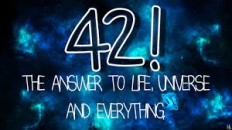 “It highlighted an important point, which is that a lot of times the question is harder than the answer. And if you can properly phrase the question, then the answer is the easy part. To the degree that we can better understand the universe, then we can better know what questions to ask. Then whatever the question is that most approximates: what’s the meaning of life? That’s the question we can ultimately get closer to understanding. And so I thought to the degree that we can expand the scope and scale of consciousness and knowledge, then that would be a good thing.” Elon Musk
“It highlighted an important point, which is that a lot of times the question is harder than the answer. And if you can properly phrase the question, then the answer is the easy part. To the degree that we can better understand the universe, then we can better know what questions to ask. Then whatever the question is that most approximates: what’s the meaning of life? That’s the question we can ultimately get closer to understanding. And so I thought to the degree that we can expand the scope and scale of consciousness and knowledge, then that would be a good thing.” Elon Musk
Walter Isaacson, the author of Jobs’ biography wrote that Jobs felt throughout his life that he was on a journey — and he often said, ‘The journey was the reward.’ But that journey involved resolving conflicts about his role in this world: why he was here and what it was all about. He had a lifelong interest in Zen Buddhism and they discussed whether or not he believed in an afterlife.
“Sometimes I’m 50-50 on whether there’s a God. It’s the great mystery we never quite know. But I like to believe there’s an afterlife. I like to believe the accumulated wisdom doesn’t just disappear when you die, but somehow it endures.” Steve Jobs
5. Impact
Although Musk isn’t yet the household name that Jobs has become, those who’re familiar with Musk’s work and genius compare him to Leonardo da Vinci and The Atlantic recently described him as one of the most ambitious innovators of this era. And what about Steve Jobs? He was described in the study as “a star of popular culture.”
Ouch!
During our interview, Musk shared the story of his brief encounter with the great Steve Jobs. The two were introduced by Google’s Larry Page at a party and Musk describes Jobs as being “super rude” to him. Nevertheless, this didn’t dent his admiration for the Apple guru. Here’s our dialogue:
Elon Musk: “The guy had a certain magic about him that was really inspiring. I think that’s really great.”
Alison van Diggelen: “Is it that magic that you try to emulate?”
Elon Musk: “No, I think Steve Jobs was way cooler than I am.”
 Although Apple fans will agree strongly with that assessment, feedback at YouTube loudly contradicts Musk. Here’s one of the more polite reactions:
Although Apple fans will agree strongly with that assessment, feedback at YouTube loudly contradicts Musk. Here’s one of the more polite reactions:
“Sounds just like Thomas Edison and Nikola Tesla. Except Elon Musk will probably end up being much more memorable than Steve Jobs :P”
As 2014 begins, Musk is still right, Steve Jobs is generally perceived as being “way cooler” than him. But that could change.
What will the history books conclude, in ten or twenty years from now? Steve Jobs certainly has big shoes to fill, but Elon Musk is already beginning to fill them. A lot will depend on Musk’s ability to see his grand visions come to fruition. First, he must complete his “Secret Master Plan for Tesla,” which includes the creation of a popular mass market electric car; and second, his vision of making space rockets reusable just like modern day jets.
One day, he may even achieve his life’s mission of dying on Mars, but as he describes it, “Just not on impact.”
Now that would be cool.
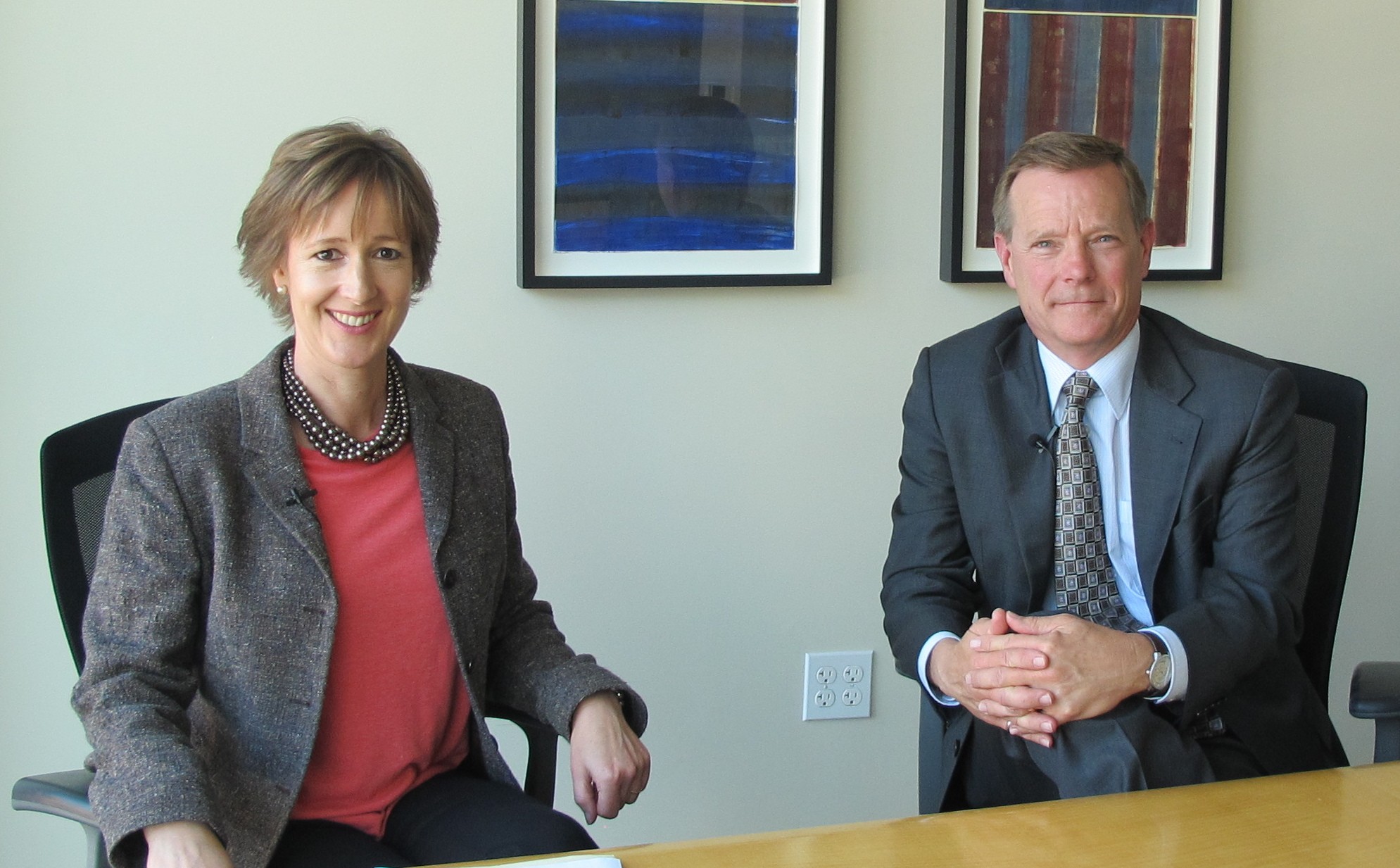
Oct 10, 2013 | Green Building, Sustainability
By Alison van Diggelen, host of Fresh Dialogues
I sat down with Phil Williams of Webcor Builders to find out how the building industry is responding to climate change by quantifying a building’s environmental impact (water, CO2 production, etc) using Natural Capital Accounting (NCA).
“CFOs of major corporations are saying, ‘before it was random acts of greenness,'” says Williams. “Now I can start to measure our environmental impact.”
As he explains it, a global standard of measuring and quantifying a building’s impact can provide owners, renters, architects, and builders with valuable information with which to make key decisions about buying, renting, land use, building materials, energy systems etc.
As well as the World Bank, the Cambridge Programme for Sustainability Leadership and the World Business Council for Sustainable Development, closer to home, Climate Earth in Berkeley is working on the task.
Climate Earth’s White Paper “Valuing Natural Capital” states: “The objective of this project is to develop an estimate of the environmental costs of the greenhouse gas emissions, induced land use changes, and water consumption. For land use change and water consumption, environmental costs are dependent on where the activity takes place, and we developed local cost estimates to account for those differences. Greenhouse gas emissions are a global pollutant, and the costs are roughly indifferent to where the emissions take place, and so a single global number is sufficient to account for those costs.” The paper concluded that the Stern Review’s figure of $110/metric ton of carbon and carbon equivalent is appropriate.
.
.
“NCA takes some of those numeric evaluations – kilograms of CO2, liters of water, hectares of land – and puts them into economic evaluations that large corporations and nimble companies can look at, ” explains Williams. “These are not just environmental metrics, these are just financial metrics.”
He predicts that by the end of 2014, there will be recognized standards in Natural Capital Accounting for construction, apparel and other retail products.
Find out more about the Future of Natural Capital Accounting from the World Forum on NCA which takes place in Edinburgh, Scotland this November.
During our interview, Williams also explains the concept of making buildings “Future Ready” i.e. flexible enough to add solar, and other energy-making, energy-saving components after the building is completed.
“Future ready is a positive approach, it’s not about adding more, it’s not about ultimate flexibility,” says Williams. “It’s about providing the right amount of infrastructure to afford flexibility.”
This is part of a series on the Future of Green Building, sponsored by Webcor Builders. For more in the series, check out these videos and stories
Read more about Green Building stories featuring Meryl Streep, Susan Sarandon and Apple and by checking the Green Building tab above or clicking here
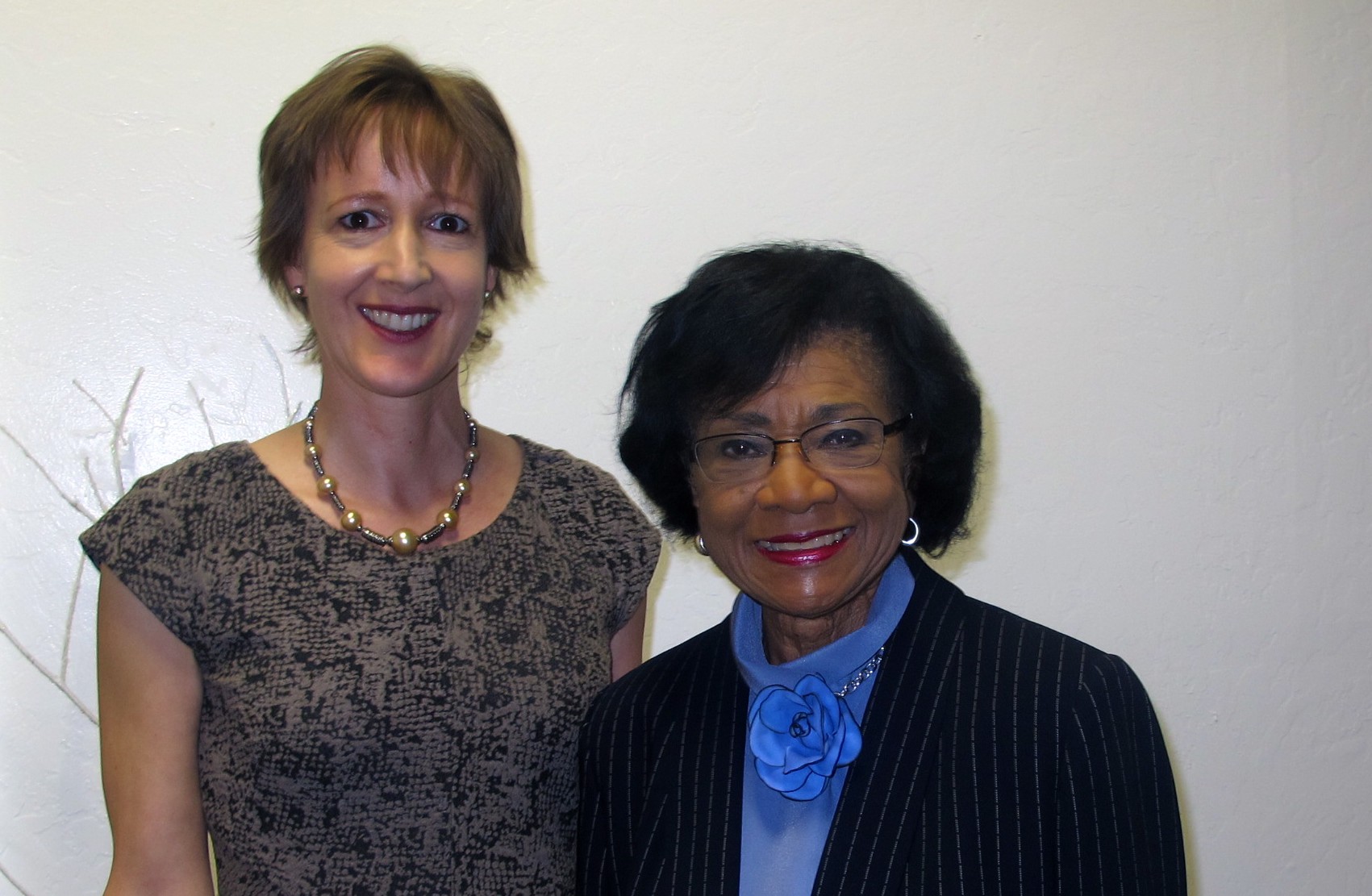
Aug 22, 2013 | Inspiring Women, Just for mothers
Alison van Diggelen, host of Fresh Dialogues
Fidel Castro, Muhammad Ali, Gloria Steinem. These are just a few of the icons that pioneering journalist Belva Davis has interviewed in over fifty years of reporting. This weekend, Davis receives the John F. Hogan Distinguished Service Award from the Radio Television Digital News Association (RTDNA) in Los Angeles.
Davis began her illustrious career in the 1950’s; became the first black woman to anchor the news on the West Coast and was host of KQED’s public affairs program, This Week in Northern California for almost 20 years. She talked to Fresh Dialogues this summer in Los Altos about why she admires PBS Newshour’s history making Judy Woodruff and Gwen Ifill; her memoir; and the need for both curiosity and passion in a successful career. Davis also explains her need to prove herself every day. “Go home if you don’t feel some sense of gratitude for the next day’s possibilities,” she says.
.
.
ALISON VAN DIGGELEN: Hello and welcome to Fresh Dialogues. Today I’m with pioneering journalist, Belva Davis. She has a new book and it’s called Never In My Wildest Dreams. Belva, thank you for joining me today.
BELVA DAVIS: Well thank you. This is a wonderful opportunity.
ALISON VAN DIGGELEN: So let’s talk about those wildest dreams. When did you feel your wildest dreams were coming true?
BELVA DAVIS: Definitely I know when I decided that this reckless course was the one I was going to take, and that is to try to break into television news reporting. And to do that without having an example of anyone that looked even slightly like me who was doing it, I think took quite a commitment, to say I’ll do what’s necessary…
ALISON VAN DIGGELEN: …And a lot of courage. So you really had no role models. Today we talk about role models and we can emulate this person or that. You had no one?
BELVA DAVIS: No one.
ALISON VAN DIGGELEN: If you were to go back to being 30 or 40 years old, what advice would you give yourself?
BELVA DAVIS: I always tell people, if you are not doing…Number one: if you don’t have curiosity about what you’ve chosen to do with your life, and if you don’t have passion for what you say you want to do with your life, you should keep looking.
ALISON VAN DIGGELEN: Right, so passion and curiosity. They’re both really important.
BELVA DAVIS: Right, because one keeps you going, and wanting to know more about what you’re doing. By wanting to know more, then you get better. You don’t just sit there from wherever point you entered whatever arena you’re in. And you have to have passion to give the extra time. You can’t just do something that at 5 o’clock you turn off a key. That just doesn’t work.
ALISON VAN DIGGELEN: And what about today? For young aspiring journalists, who are the good female role models today? Who would you point to and say: she’s got it right. She’s nailing it. Is there anyone you tune into?
BELVA DAVIS: (Laughter) I love everybody…
ALISON VAN DIGGELEN: You don’t want to pick favorites?
BELVA DAVIS: But I do think that the PBS team, you know Judy Woodruff and Gwen Ifill is hard to beat.
ALISON VAN DIGGELEN: Yes
BELVA DAVIS: I wouldn’t put them in the “young girl category” but they’re both really intelligent, smart, good reporters and I admire them.
ALISON VAN DIGGELEN: Yes
BELVA DAVIS: I’ve long…as a young woman…Soledad O’Brien I think has been a brave woman, you know raising her children and taking these really dangerous assignments. So, they’re still out there.
ALISON VAN DIGGELEN: I saw that wonderful interview with you and Judy Woodruff and you said something that really made me pause because there you are, you’ve been doing this for 50 years, and you said “I feel I still have to prove myself every day.”
BELVA DAVIS: Yes…I do.
ALISON VAN DIGGELEN: Talk about that. What is it that’s driving you? You don’t feel that hey, I’ve interviewed Muhammad Ali, I’ve interviewed Fidel Castro, I’ve interviewed…presidents…
BELVA DAVIS: You should go home when you don’t have anybody else you want to interview. You should go home when you can’t feel some sense of gratitude for the next day’s possibilities. The next day’s possibilities are what keeps you going forward. I mean if she (Sheryl Sandberg) talks “leaning in,” that keeps you going. Just realizing what could be, if you just do a little more, push a little harder, give someone else an opportunity.
ALISON VAN DIGGELEN: Wonderful, Belva Davis. We’ll leave it on that note. Thank you so much for taking time for Fresh Dialogues.
BELVA DAVIS: Thank you.
Find out more:
See Fresh Dialogues Interview with PBS’ Charlie Rose on the burning curiosity that got him in trouble as a youth and today drives his “great and glorious life.”
See Fresh Dialogues video: Sheryl Sandberg on why women today should “Lean In.”
Columnist Leonard Pitts on The Hard Truths of Being Black in America
Photo credits: Lina Broydo
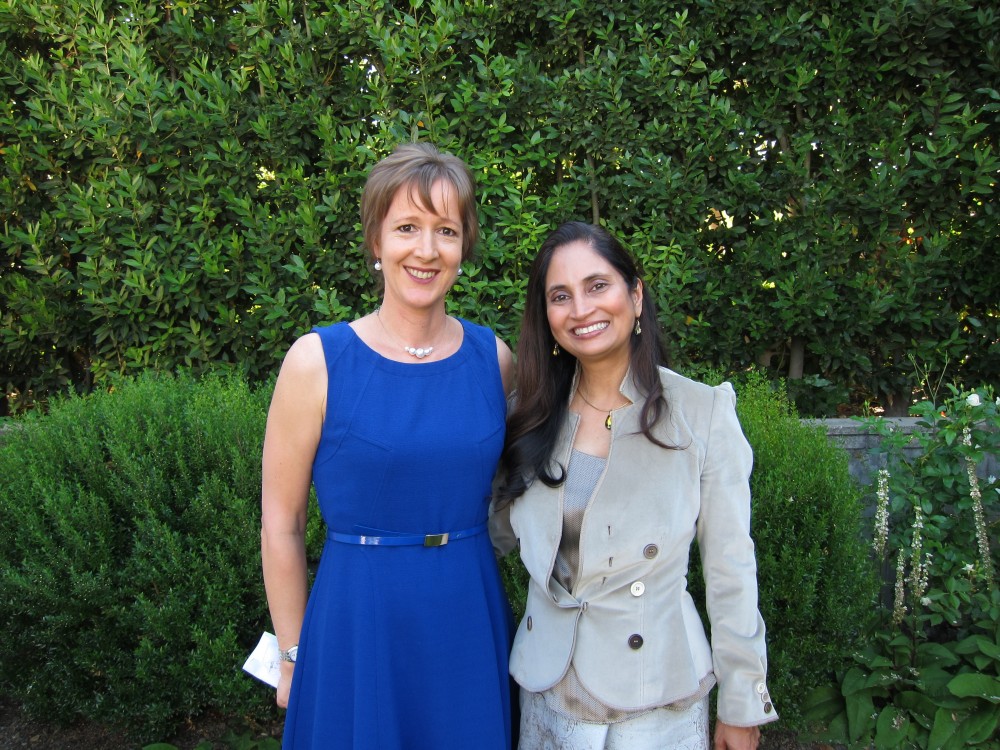
Aug 16, 2013 | Inspiring Women, Just for mothers, Silicon Valley Events
Alison van Diggelen, host of Fresh Dialogues
Cisco System’s CTO Padmasree Warrior discusses the “Lean In” Movement, and what lessons she’s learned in her remarkable career. Warrior, an influential Silicon Valley tech leader, on the Forbes List of 100 Most Powerful Women, says women shouldn’t hold themselves back, they should be “out there and leaning in to opportunities.”
.
.
Warrior emphasizes the importance of authenticity in leadership, letting people see “who you truly are.” Of course, being approachable…coaching, mentoring, and brainstorming ideas with your team are also key, she says.
On the question of finding balance in your life, Warrior is blunt. “I don’t like the word ‘balance,’” she says. “To me that somehow conjures up conflict between work and family…as long as we think of these things as conflicting, we will never have happiness. True happiness comes from integration…of work, family, self, community.”
Warrior dedicates Saturday as her digital detox day where she puts down her smartphone and busies herself with family and gardening, painting, cooking, even haiku. Check out her eclectic Twitter feed to learn more.
She told me that letting go of guilt is a vital lesson. “When my son was growing up, I was always guilty, no matter what I did, ” she says. “Make decisions and be happy with the decisions you’ve made. I tell myself in the long run, it’s the love, the quality of relationships that you have with your family, your friends and giving back to the community that matters.”
Here’s a summary of Warrior’s Seven Secrets of Success. Watch the video for all the details.
1. Be authentic, approachable
2. Mentor and coach others
3. Be out there and “lean in” to opportunities
4. Forget “balance” – integrate work, family, self, community
5. Avoid guilt
6. Be happy with your decisions
7. Think long-term and focus on relationship quality
The interview was recorded at SVForum’s Visionary Awards in Silicon Valley, June 26, 2013. Warrior was one of four honorees. Find out more about Warrior and her advice for getting more women in STEM.
Alison van Diggelen asks Fresh Questions and gets Fresh Answers. Find out more about her green interview series. And join the conversation on Facebook.
This is part of a special “Inspiring Women” series at Fresh Dialogues featuring Meryl Streep, Sheryl Sandberg, Jennifer Granholm, Maureen Dowd, and Belva Davis.
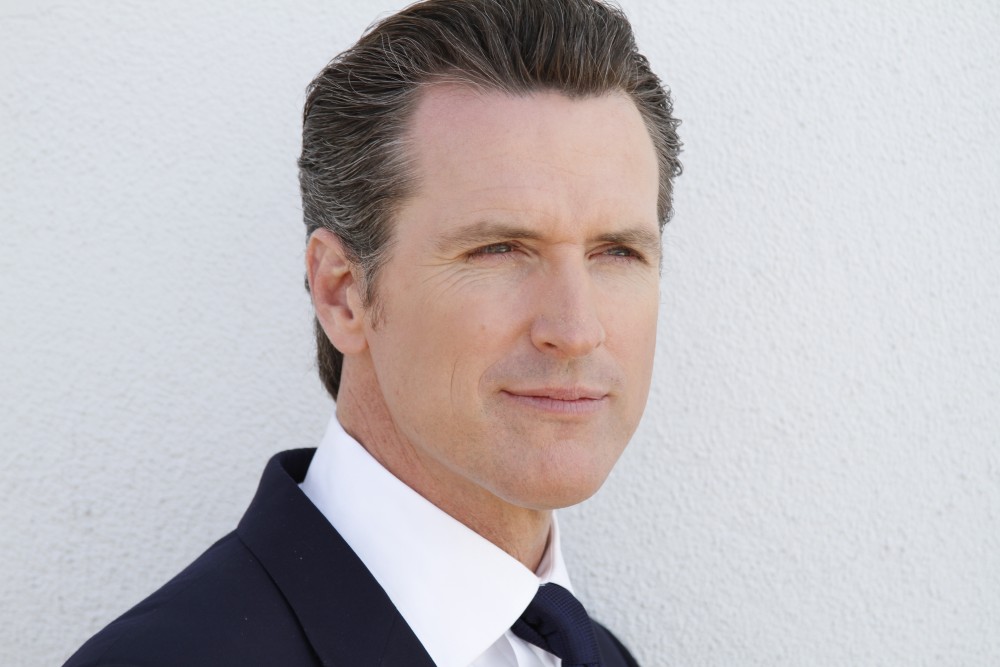
Jul 17, 2013 | Policy, Summits & Conferences
Alison van Diggelen, host of Fresh Dialogues
In this exclusive Fresh Dialogues interview, Gavin Newsom, Lt. Governor of California and new father, explains why the U.S. requires a national carbon tax. Newsom was attending the NY Times Global Forum in San Francisco, June 20, and shared his views on climate change, oil companies and his dream of being Governor of California one day.
Newsom, whose wife Jennifer Siebel, just gave birth to their third child on July 3rd, frames the argument in a way that even a five-year old can understand.
“You wanna move the mouse, you gotta move the cheese,” says Newsom, who describes other measures to combat climate change, such as composting, green building, plastic bag bans etc., as “playing a bit in the margins.”
.
Newsom argues that putting a price on carbon is the real macro solution to climate change. Nevertheless, he praises the entrepreneurial spirit of many city mayors who have proved that you can grow your economy and reduce your Green House Gas emissions. Local case in point: San Jose Mayor Chuck Reed’s Green Vision
Here are some highlights of our conversation
On Oil Companies and Interesting Bed Fellows
Newsom: “Some of the big oil companies are talking about a carbon tax as they’re more and more concerned about cap and trade…especially in California with AB 32. Now they’re saying, ‘now wait…a carbon tax may make sense.’ Interesting bedfellows now. I think there’s a different dialogue that could potentially be held. I’m not suggesting for a moment that Chevron is saying ‘time for a carbon tax’ but in the private conversations that I’ve had with a lot of these big energy producers, you don’t have that negative reaction that we had four or five years ago…”
Fresh Dialogues: What’s in it for the oil companies?
Newsom: “I don’t want to put words in their mouth. The bottom line is: what most of these big producers want is consistency across jurisdictions.”
On Leaning In to Green Growth
“I want to see a standard that could bring this country back to international prominence in terms of leaning into a low carbon green growth strategy, so that we can dramatically change the way we produce and consume energy and lead the world as a pace setter in terms of efforts to reduce Green House Gas emissions and radically reorient our economy in a 21st Century manner that could produce jobs and address stresses on the economy: inequality, lack of middle income…and create sustainable opportunities.”
On Being Governor of California
“No one knows what the future holds politically speaking. I have got an entrepreneurial energy. I like doing, not just being. I’ve long talked about the position as governor, as a platform to really engage in bottom up thinking and go local in terms of economic development strategies, workforce development strategies and find substantive solutions to deal with the issue of climate change. So inverting the pyramid, but being there in Sacramento to begin to scale those best practices is something I’ve long wanted to do.”
See more videos and stories on energy policy and join the conversation at our Fresh Dialogues Facebook Page
This exclusive Fresh Dialogues interview was recorded at the New York Times Global Forum in San Francisco, June 20, 2013. The forum organizers provided the painful background music, which sadly couldn’t be removed from the audio track.

 “It highlighted an important point, which is that a lot of times the question is harder than the answer. And if you can properly phrase the question, then the answer is the easy part. To the degree that we can better understand the universe, then we can better know what questions to ask. Then whatever the question is that most approximates: what’s the meaning of life? That’s the question we can ultimately get closer to understanding. And so I thought to the degree that we can expand the scope and scale of consciousness and knowledge, then that would be a good thing.” Elon Musk
“It highlighted an important point, which is that a lot of times the question is harder than the answer. And if you can properly phrase the question, then the answer is the easy part. To the degree that we can better understand the universe, then we can better know what questions to ask. Then whatever the question is that most approximates: what’s the meaning of life? That’s the question we can ultimately get closer to understanding. And so I thought to the degree that we can expand the scope and scale of consciousness and knowledge, then that would be a good thing.” Elon Musk Although Apple fans will agree strongly with that assessment, feedback at YouTube loudly contradicts Musk. Here’s one of the more polite reactions:
Although Apple fans will agree strongly with that assessment, feedback at YouTube loudly contradicts Musk. Here’s one of the more polite reactions:








